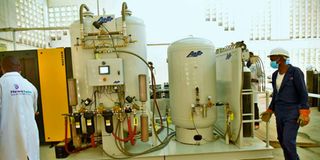AI X-ray machines to boost TB diagnosis at Nakuru referral hospital

An oxygen production machine at Nakuru Level Five Hospital.
What you need to know:
- Chest X-rays are a common method for screening and triaging people for TB and assessing lung damage.
- With AI, results are more precise and available within minutes, allowing health workers to quickly determine the next steps for TB care for patients.
The fight against tuberculosis (TB) at Nakuru Level Five Hospital, the largest hospital in South Rift region, has received a significant boost with the acquisition of a digital AI-enabled X-ray machine.
This advanced technology, the first of its kind in Nakuru, aims to enhance the precision and efficiency of TB diagnosis at the hospital, facilitating appropriate treatment.
The machine was acquired through support from the National TB Programme, the African Medical Research Foundation and Qure.ai, an AI solutions provider.
It is expected to revolutionise TB diagnosis by enhancing imaging accuracy through AI-supported tools and reducing turnaround time for patients.
The AI tools can read chest X-rays, assisting healthcare professionals in making accurate diagnoses. Radiologists, radiographers and clinical officers from the chest clinic and the hospital’s outpatient department have already been trained on the use of this technology.
Chest X-rays are a common method for screening and triaging people for TB and assessing lung damage. With AI, results are more precise and available within minutes, allowing health workers to quickly determine the next steps for TB care for patients.
"The technology will be a game changer at the facility that serves about six counties. Artificial Intelligence screens for TB more accurately, leading to improved treatment for patients. The AI-enabled X-ray machine will make things easier for doctors and patients and play an important role in TB treatment," Nakuru County Health Executive Roselyn Mungai said.
Eradication of TB in Africa has been challenging due to various social, economic, healthcare, and biological factors.
The co-infection of HIV/Aids and TB is a major challenge as it weakens the immune system, making individuals more susceptible to TB and complicating the management of both diseases.
Limited access to healthcare due to poverty, the high cost of treatment, and the inability to maintain proper nutrition, which is crucial for TB recovery, have exacerbated the situation.
"Nakuru is now a step forward in the fight against TB, having tapped into the technology to provide automated interpretation of radiology exams like X-rays, CTs and ultrasound scans, enabling faster diagnosis and speedier treatment of the disease," said Ms Mungai.
Nakuru Level Five Hospital is now among eight facilities nationwide that have initiated the programme of Digital Chest X-ray (DCXR) with AI, introducing the new diagnostic tools in accordance with World Health Organization recommendations under the TB Programme supported by USAID through the STOP TB Partnership.
Tuberculosis remains a major cause of morbidity and mortality in Kenya. It affects all age groups, but has its greatest toll in the most productive age group of 15 to 44 years.
The major factor responsible for the large TB disease burden in Kenya is the concurrent HIV epidemic.
New tech to improve access to cardiac care in remote areas
Meanwhile, patients with heart disease in remote and outreach areas will have access to improved care through the use of a new technology that enables cardiologists to review patients' electrocardiogram (ECG) data even when they are far from the examining physician.
This follows a partnership between GE HealthCare, a global leader in healthcare technology, and Daktari Africa, a pioneering telemedicine platform, to support Kenya's National Strategic Plan for the Prevention and Control of Non-Communicable Diseases by helping clinicians better diagnose and treat cardiovascular disease.
The MUSE™ NX software, developed by GE HealthCare, allows for easy integration, enhanced security protection and rapid deployment of updates, ultimately supporting fast and accurate diagnoses.
With GE HealthCare's support, Daktari Africa will work with the Kiambu County government to implement the MUSE™ NX system in health centres across the county.
Following the installation of the MUSE™ NX system, the GE HealthCare team will provide training to Daktari Africa and its partners to ensure that healthcare professionals are equipped with the necessary skills to maximise the impact of the platform.
“This collaboration seeks to revolutionise cardiac care in Kenya by bringing advanced diagnostic capabilities to remote areas. Through tele-ECG screenings, we can facilitate early detection of critical conditions, reduce hospitalisations and improve patient outcomes. We are pleased to be working with GE HealthCare to make a positive impact on healthcare delivery in our country," said Dr Charles Kamotho, founder and CEO of Daktari Africa.
“By providing physicians with access to patient ECG information, the MUSE™ NX solution will support informed decision-making and high-quality care for a disease that is placing an increasing burden on the nation’s health system. By combining clinical expertise, telemedicine specialisation and advanced healthcare technologies, we can help save time in the diagnosis and treatment process, increase staff productivity and enhance patient care quality," said Moussa Gholmieh, general manager for Patient Care Solutions, Emerging Markets, GE HealthCare
According to the World Health Organization, cardiovascular disease is the leading cause of non-communicable disease mortality in the country.






